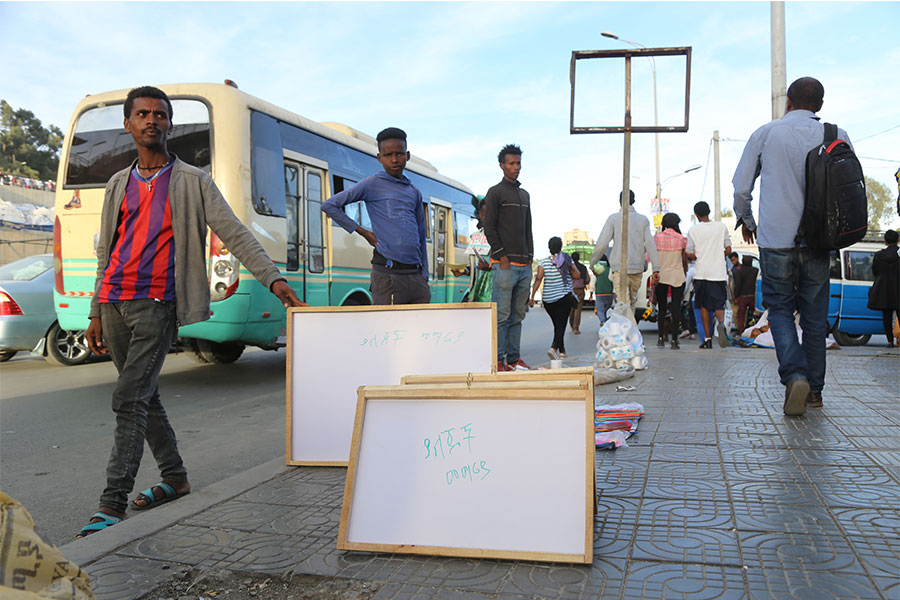
Commentaries | Jul 22,2023
Oct 8 , 2022
By Abraham Tekle
Many say since its establishment in the 19th Century, Addis Abeba has always seemed like a magical portal, a gateway to another world. For the rural mass, it was, and is, a city whose streets are full of glittery and gold. And for that, many deluges into the capital to scrub their pieces of it.
It is indeed a common sight to see street vendors rooming around and tightening the sidewalk to its edge. No one seems to care about it anymore. Street hustle is given little significance, especially by the authority, unlike in Kenya, where the newly elected government of William Ruto gives “hustling” a whole lot of new ideological colour. Under his rule, President Ruto declared that Kenya is a “hustler nation” under his rule.
Vendors come to Addis Abeba hunting for a better life and a place to sell whatever products they can manage to grasp in their hands. The increasing number of vendors in the streets is a proximate reflection of the number of people entering the city and the authority’s reluctance to timely and adequately respond to deal with the issue.
Street hawking has stretched itself larger than it seems and is also deeply rooted by nature. But the consensus would be that the growing urbanization is the triggering point. It is a significant setback for the free traffic flow of city roads. Street vendors conduct their informal businesses on the sidewalks pedestrians use. It leads to a conflict in public space use and a question of whether street vendors are contributing to the vibrancy of a city or creating a nuisance to pedestrians, affecting the landscape to adapt to new things.
Do they have anything good to contribute beyond? Fairly, yes. But the question should be, how?
Street vendors demonstrate dense, less effective, inefficient, and highly constrained network structures. They exhibit a more significant proportion of solid ties with their peers and customers bound in their network. They also have most of their relationships with people from lower occupational status, wagers, and the needy. Unsurprisingly, the vendors could create networks that city dwellers feel undermine their standard of living. They also share the same pie.
Notwithstanding the challenges associated with informal marketing, the lack of support from state institutions, the high cost of living, and stagnant wages let street vending become the primary option for vendors to earn a living. They often provide different kinds of items illicitly imported into the country and sell them back to their networks at discounted prices. The cost of items and commodity prices skyrocket daily; living hardship directs many toward the same network. It forces people to seek suitable options to lessen their burden and often make themselves prey to such networks.
Would street marketing be the viable solution for our living misery? And, what to do next?
Although the city authorities have recently made efforts to reduce the number of vendors out on the street, more community-based efforts should be encouraged and supported to address the problem. One way they can help offset this is by offering vendors incentives for renting or helping to form associations designed to allocate them off the streets.
Undoubtedly, initiating such programs can substitute for or supplement the ongoing problems of street vending. It is beneficial for easing traffic congestion and instils a sense of order and formality.
PUBLISHED ON
Oct 08,2022 [ VOL
23 , NO
1171]


Commentaries | Jul 22,2023


Sunday with Eden | Apr 08,2023

Featured | Feb 23,2019

Fortune News | Feb 05,2022

View From Arada | Jan 07,2023

Viewpoints | Sep 23,2023

Fortune News | Oct 13, 2024

Commentaries | Sep 06,2025

Commentaries | Nov 18,2023

Photo Gallery | 173515 Views | May 06,2019

Photo Gallery | 163736 Views | Apr 26,2019

Photo Gallery | 153738 Views | Oct 06,2021

My Opinion | 136529 Views | Aug 14,2021
Editorial | Oct 11,2025

Dec 22 , 2024 . By TIZITA SHEWAFERAW
Charged with transforming colossal state-owned enterprises into modern and competitiv...

Aug 18 , 2024 . By AKSAH ITALO
Although predictable Yonas Zerihun's job in the ride-hailing service is not immune to...

Jul 28 , 2024 . By TIZITA SHEWAFERAW
Unhabitual, perhaps too many, Samuel Gebreyohannes, 38, used to occasionally enjoy a couple of beers at breakfast. However, he recently swit...

Jul 13 , 2024 . By AKSAH ITALO
Investors who rely on tractors, trucks, and field vehicles for commuting, transporting commodities, and f...

Oct 11 , 2025
Ladislas Farago, a roving Associated Press (AP) correspondent, arrived in Ethiopia in...

Oct 4 , 2025
Eyob Tekalegn (PhD) had been in the Governor's chair for only weeks when, on Septembe...

Sep 27 , 2025
Four years into an experiment with “shock therapy” in education, the national moo...

Sep 20 , 2025
Getachew Reda's return to the national stage was always going to stir attention. Once...

Oct 12 , 2025
Tomato prices in Addis Abeba have surged to unprecedented levels, with retail stands charging between 85 Br and 140 Br a kilo, nearly triple...

Oct 12 , 2025 . By BEZAWIT HULUAGER
A sweeping change in the vehicle licensing system has tilted the scales in favour of electric vehicle (EV...

Oct 12 , 2025 . By NAHOM AYELE
A simmering dispute between the legal profession and the federal government is nearing a breaking point,...

Oct 12 , 2025 . By NAHOM AYELE
A violent storm that ripped through the flower belt of Bishoftu (Debreziet), 45Km east of the capital, in...